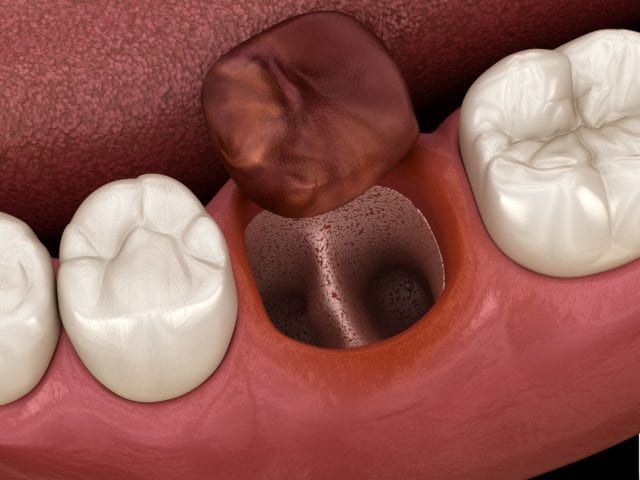There are some cases where you may need to have a tooth extraction before getting dental implants. One example is if you have one or more teeth that are significantly damaged or decayed and are already loose. Another example is when you are having all-on-four implants placed and any existing teeth need to be removed. Although most tooth extractions have no postoperative complications, there is a 2-5% chance of developing something called a dry socket. However, if you are having your implants placed immediately following an extraction, you will not be at risk for a dry socket.
What is a dry socket?

A dry socket, formally known as alveolar osteitis, occurs when there is no protective blood clot in the tooth socket after extraction. Sometimes this happens because the clot fails to form and other times it can happen because the clot formed, but was dislodged. Without the protective blood clot, the underlying tissues, bone, and nerve endings are exposed.
What are the symptoms of a dry socket?
The most common symptom associated with a dry socket is pain that occurs as a result of exposed nerve endings. When you have a dry socket, you may experience a deep, throbbing pain in your jaw or in your face on the side of the extraction. In some cases, this pain may also radiate into the ears, eyes, temples, or neck. Some other symptoms of a dry socket include a bad taste or smell in the mouth, as well as being able to see exposed bone when looking at the socket.
What is the treatment for a dry socket?
Luckily, dry sockets can be treated pretty easily. First, your implant dentist will need to evaluate the extraction site to determine if the cause of your discomfort is due to a dry socket. If so, then they will gently clean the socket before packing it with gauze and pain medications. Treating a dry socket relieves the pain almost instantly and is highly effective for preventing future discomfort as the area heals. Your dentist may also provide you with some supplies to take home.
Am I at risk for a dry socket?
Some people are at a higher risk of developing a dry socket such as those who smoke, use oral contraceptives, or who are having teeth extracted from the lower jaw or back of the mouth. If you smoke, your implant dentist will recommend temporarily stopping because tobacco can delay healing and prevent a blood clot from forming. If you are on oral contraceptives, your implant dentist may also recommend temporarily stopping because high estrogen levels can cause excess bleeding and a lack of clot formation.
Can I prevent a dry socket?
While some cases of dry socket are unavoidable, there are a few things you can do to reduce the risk of developing a dry socket. The best way to prevent a dry socket is to follow all your implant dentist’s instructions before and after your tooth extraction. These instructions are specifically designed to prevent complications like dry sockets, and to speed up the healing process.

